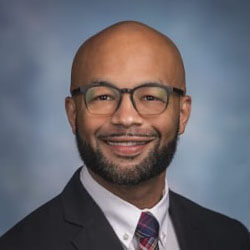
Michigan Center for Urban African American Aging Research
Summer Mentoring Program Application
MCUAAAR Scientists
2023 Scientists
Carrie Leach
Research Assistant Professor, Institute of Gerontology, Wayne State University, Detroit, MI
Co-Director, Community Engagement Core, Center for Urban Responses to Environmental Stressors (CURES)
PhD, Health Communication, 2019, Wayne State University, Detroit, MI
MPA, Master of Public Administration, 2009, Non-Profit Policy & Leadership Concentration, Wayne State University, Detroit, MI
More about Carrie Leach
Carrie Leach is a Research Assistant Professor at the Institute of Gerontology at Wayne State University. She is a health communication expert with more than 15 years of experience in community engagement and community-based participatory research (CBPR) processes, with extensive experience conducting collaborative research with older adults. Her research aims are focused on addressing health disparities by developing community-driven solutions derived from participatory processes that will improve communication resources and the flow of and access to health protecting information to older people. Since the pandemic, she has turned her attention to older adults’ digital exclusion that exacerbates already poor health outcomes of Detroit residents, and impedes connection to vital resources, such as social services and telehealth. She has co-authored peer-reviewed journal articles and presentations with her community partners on topics related to academic-community partnerships, science communication, communication infrastructure dynamics of hard-to-reach older adults, communication disparities, and environmental health literacy, advocacy, and stewardship.
Websites
- https://iog.wayne.edu/profile/bw4730
- https://cures.wayne.edu/community-engagement
- https://check-up.wayne.edu/team
- https://www.pcori.org/research-results/2022/bridging-divide-fostering-partnerships-urban-african-american-aging-research
J. Lloyd Allen
Assistant Professor, School of Social Work, Wayne State University, Detroit, MI
PhD, School of Social Work, 2017, University of Georgia
MSW, School of Social Work, 2008, Florida International University
More about J. Lloyd Allen
Dr. Allen a tenure track, assistant professor at Wayne State University in the School of Social Work. His professional and academic goals include a) becoming both a qualitative methods and content area expert on Black men and gay men’s mental health and well-being, b) enhancing research on mental, physical, emotional, and sexual health outcomes for GLBT+ individuals, c) exploring the mental health experiences of Black/African American men while also working to develop culturally competent and timely interventions that cater to their unique lived experiences, and d) facilitating collaborative participatory action research relationships.
The genesis of this project stems from his experiences of attempting to engage with therapists who often fail to understand his lived experiences, as well as attempting to engage with Black men in therapeutic relationships and encountering resistance, for a multitude of reasons. As a researcher, and scholar, he is always interested in identifying unique ways to engage men, more specifically, Black men in mental health care that considers the varying and unique differences of their lived experiences.
Myles Durkee
Assistant Professor, Department of Psychology, University of Michigan
PhD in Educational Psychology: Applied Developmental Science, 2013, University of Virginia
More about Myles Durkee
Dr. Myles Durkee is an Assistant Professor in the Department of Psychology at the University of Michigan. He received a Bachelor’s degree in Psychology from Pomona College and a Ph.D. in Educational Psychology: Applied Developmental Science from the University of Virginia. He also completed postdoctoral fellowships at the University of Chicago and the University of Michigan. Dr. Durkee is a psychologist who examines the dynamics of cultural invalidations, racial discrimination, and racial code-switching to understand how these experiences influence important psychosocial outcomes (such as mental health & identity development). Broadly, his research examines how people of color navigate racial contexts, modify their racial behavior to fit into certain environments, and internalize messages about their cultural identity from individuals inside and outside of their racial group.
2022 Scientists
Christina J. Cross
Assistant Professor, Department of Sociology and Center for Population and Development Studies, Harvard University
Postdoctoral Fellow, Sociology, 2019-2022, Harvard University
PhD, Public Policy and Sociology, 2019, University of Michigan
MA, Sociology, 2015, University of Michigan
BA, Sociology, 2013, Emory University
[email protected]
More about Christina J. Cross
Dr. Cross’s research falls at the intersection of families, race/ethnicity, and social inequality. She examines how family structure, change, and dynamics influence individuals’ life chances, particularly among minoritized and/or low-income populations. Her work has appeared in outlets such as Social Problems, Demography, and the Journal of Marriage and Family. Her research has been supported by organizations including the National Science Foundation, the Ford Foundation, the Andrew W. Mellon Foundation, the JPB Foundation, and the Social Science Research Council. She has received awards from the American Sociological Association, including the 2020 ASA Dissertation Award, the Population Association of America, the Society for the Study of Social Problems, ProQuest, and the Midwest and Southern Sociological Societies. Cross currently serves as an editorial board member of the Journal of Marriage and Family and Research in Social Stratification and Mobility.
Mosi Ifatunji
Assistant Professor, Department of African American Studies and Sociology, University of Wisconsin
Faculty Associate, Program for Research on Black Americans, Institute for Social Research, University of Michigan
PhD, Department of Sociology, 2011 University of Illinois at Chicago
MA, Department of Sociology, 2006 University of Illinois at Chicago
BA, Department of Psychology, 2003, University of Illinois at Chicago
BA, Department of African American Studies, 2003, University of Illinois at Chicago
More about Mosi Ifatunji
Dr. Ifatunji’s primary research interests are in racial and ethnic theory and the methodologies used to study inequality and stratification. He is particularly interested in theorizing how non-phenomic characteristics contribute to racial classification and stratification. While most theories of race are based on assigning racialized meanings to people and populations according to perceived differences in skin color, hair texture and/or bone structure, he argues that racial classification often turns on non-phenomic characteristics, including language, religion, and geography. He is advancing this view by studying the ways in which African Americans and Black immigrants are racialized differently in the United States. His research draws on mostly quantitative methods, including: large-scale surveys, linked administrative data, social experiments, advanced statistics, and historiography. He has received awards from and been supported by the American Sociological Association and the National Institutes of Health. His work has been published in Sociological Forum, Sociological Perspectives, Ethnic and Racial Studies, Sociology of Race and Ethnicity and the Du Bois Review.
Yanping Jiang
Instructor, Institute for Health, Health Care Policy, and Aging Research & Department of Family Medicine and Community Health, Rutgers University, New Brunswick, NJ
PhD, Health Promotion, Education & Behavior, 2019, University of South Carolina, Columbia
ME, Developmental and Educational Psychology, 2016, South China Normal University
BS, Psychology, Chongqing University
More about Yanping Jiang
Yanping Jiang, PhD, is a health psychologist by training. Her research interests are stress and cardiometabolic health, health disparities, and resilience. Specifically, Dr. Jiang is interested in identifying biopsychosocial factors (e.g., HPA axis, immune functioning) linking chronic stressors, including low socioeconomic status, discrimination, and early childhood adversity, to poor cardiometabolic health among older adults, particularly older ethnic minority populations. Also, she is interested in investigating resilience factors at the neighborhood, family, and person levels that can alleviate the negative impact of chronic stress on health. The overall goal of Dr. Jiang’s research is to translate findings from her research and others to develop effective psychosocial interventions to reduce health disparities and promote health equity among older adults who are at increased risk of experiencing poor health.
Marion Malcome
Assistant Professor, School of Social Work, Loyola University, Chicago, IL
PhD, Social Work, 2021, University of Chicago
MSW, Social Work, 2006, University of Illinois, Urbana
BS, Psychology, 2005, University of Illinois, Urbana
More about Marion Malcome
Marion Malcome, PhD, LCSW is an Assistant Professor at Loyola University Chicago School of Social Work. Her scholarship and community work focuses on reducing health and mental health disparities within marginalized communities of color. Informed by more than a decade of clinical social work practice in community mental health, her research is situated at the intersection of race(ism), place, and mental health. Using quantitative and qualitative methodologies, she centers the lived experiences of Black mothers to examine the long-term mental health impact of exposure to multi-contextual racism, violence, and other stressors within high-burden urban neighborhoods and communities. She uses findings from her research to inform the development and testing of anti-racist, culturally relevant mental health practices and policies designed to improve quality of care and lead to health equity for Black mothers across the life course. Dr. Malcome’s previous work has been funded by the Agency for Healthcare Research and Quality (AHQR) T32 Health Services Research Predoctoral Training Program.
Antonius Skipper
Assistant Professor, Gerontology Institute, Georgia State University, Atlanta, GA
PhD, Social Work, 2016, Louisiana State University
MA, Education, 2016, Louisiana State University
MA, Gerontology, 2012, Georgia State University
BS, Exercise Science, 2007 Georgia State University
More about Antonius Skipper
Antonius D. Skipper, Ph.D. is an Assistant Professor of Gerontology at Georgia State University. His research broadly involves understanding relationships, religion, and health decisions among African Americans across the life course. As a member of the American Families of Faith Project, he conducts in-depth interviews with enduring African American couples to examine the religious processes and coping mechanisms that contribute to familial stability. In addition, his work adopts strength-focused approaches to highlighting social factors, such as dyadic support and fictive kin, as determinants of health for older African Americans. Dr. Skipper’s work is present in several high-impact journals on gerontology and family studies. He maintains a connection to the broader older adult community by sharing his work in senior housing, on podcasts, and through radio and research briefs. Dr. Skipper’s honors include fellow of the Butler-Williams Scholars Program, fellow of the Michigan Integrative Well-Being and Inequality Program, and selection into Georgia State University’s 40 Under 40.
2021 Scientists
Ryon J. Cobb
Assistant Professor of Social Work, Chancellor’s Scholar for Inclusive Excellence in Research on Black Americans, Rutgers University
Board Member/Chair of Research Committee, Center for Institutional Courage
Postdoctoral Scholar, Social Work & Gerontology, 2013 – 2018, University of Southern California
PhD, Sociology, 2013, Florida State University
M.S., Sociology, 2010, Florida State University
B.A., Secondary Education, 2003, Indiana University
[email protected]
More about Ryon J. Cobb
Several agencies within and outside the National Institutes of Health recognize his accomplishments and promise as a scholar. Early in his graduate career, Dr. Cobb acquired funding from the Ford Foundation Predoctoral Fellowship, Louisville Institute, and the National Center on Minority Health and Health Disparities. Recently, two signature NIH programs for early-career scholars selected him, through a competitive process, as an early-career faculty fellow. Both programs provide him with funding and mentored training in grantsmanship to refine critical skills for writing NIH-level applications centered on building translational portfolio research aimed at improving the renal health of older Black adults.
Angela Elam
Assistant Professor, Department of Ophthalmology and Visual Sciences, University of Michigan Medical School
Fellow, 2015, Glaucoma, University of Michigan
Resident, 2013, Ophthalmology, University of Pittsburgh
Internship, 2010, Internal Medicine, Albert Einstein Medical Center
M.D., 2009, Medicine, Duke University
B.S., B.A, 2004, Neuroscience and Spanish, University of Pittsburgh
[email protected]
More about Angela Elam
Angela Elam, MD is an assistant professor at the University of Michigan specializing in Glaucoma and Anterior Segment Disease. She is dedicated to providing excellent clinical care, while also continuing her efforts to decrease disparities in eye care through health services and community-engaged research. With grant support from the National Institutes of Health (K23 and Loan Repayment Program), Fight for Sight (Joanne Angle Public Health Award), Research to Prevent Blindness, and the Center for Disease Control, she continues to meaningfully contribute to the eye care disparities research literature, while exploring ways to improve utilization of glaucoma care, particularly by vulnerable populations.
Christy L. Erving
Associate Professor, Department of Sociology, Population Research Center, The University of Texas at Austin
Postdoctoral Fellow, 2016, Population Health Science, University of Wisconsin-Madison
PhD, 2014, Sociology, Indiana University, Bloomington
MA, 2009, Sociology, Indiana University, Bloomington
BA, 2007, Sociology and Hispanic Studies, Rice University
[email protected]
More about Christy L. Erving
Christy L. Erving, PhD is a medical sociologist by training, with specific research interests in understanding the social factors that produce and maintain disparities in physical and psychological health. She has extensive experience analyzing data from several large datasets including the Health and Retirement Study, National Survey of American Life, and National Comorbidity Survey-Replication. Dr. Erving seeks to improve the quality of life and well-being of Black women across their life span, from early adulthood through late-life by examining how their gendered and racialized life experiences negatively and positively influence their health. Her research has been published in American Journal of Epidemiology, Journal of Health and Social Behavior, Society and Mental Health, Ethnicity and Health, Aging & Mental Health, as well as other high-impact race and sociology journal outlets. Dr. Erving’s research has been funded by the American Sociological Association, Ford Foundation, Robert Wood Johnson Foundation, and Woodrow Wilson Foundation. Her long-term career aspiration is to be an independent NIH-funded health researcher and mentor conducting research that uncovers the ways in which environmental, sociocultural, and psychological mechanisms contribute to health disparities along the dimensions of race/ethnicity, gender, immigrant status, and socioeconomic position.
Areeba T. Jawed
Assistant Professor, Medical School, University of Michigan
Fellowship, 2020, Palliative Care, Indiana University School of Medicine
Fellowship, 2016, Clinical Ethics, Fairbanks Center for Ethics, Indiana University Health
Fellowship, 2016, Nephrology, Indiana University School of Medicine
Residency, 2014, Internal Medicine, Indiana University School of Medicine
M.B., B.S., 2009, Masters in Medicine and Surgery, The Aga Khan University
[email protected]
More about Areeba T. Jawed
Areeba Jawed, MD is a dual trained physician in nephrology, palliative medicine and clinical ethics. Her clinical interest is the development of conservative renal care programs for older adults foregoing dialysis and enhanced palliative care delivery for patients with chronic kidney disease. Dr. Jawed is also Vital Talk Associate Faculty (www.vitaltalk.org) and teaches communication skills surrounding serious conversations and breaking bad news to trainees and attending physicians nationally.
Her research interest is in the overlap of ethical issues and palliative care within nephrology. This includes symptom burden in chronic kidney disease and conservative medical management of older patients with chronic kidney disease. She has also written extensively on ethically challenging issues such as the practice of emergent dialysis in undocumented immigrants who do not qualify for federally funded insurance programs. Her clinical work in palliative care sparked interest in racial disparities within palliative care utilization and delivery. As a MCUAAAR research scientist she will investigate racial disparities in palliative care utilization among older stroke patients which will inform future interventions to enhance palliative care utilization in minority patients with serious illnesses.
Hee Rin Lee
Assistant Professor, Department of Media and Information, College of Communication Arts and Sciences, Michigan State University
Postdoctoral Fellow, 2019, Computer Science & Engineering, University of California at San Diego
PhD, 2017, Informatics and Computing, Indiana University
M.S., 2011, Human-Computer Interaction, Georgia Institute of Technology
M.S., 2007, Digital Media, Georgia Institute of Technology
[email protected]
More about Hee Rin Lee
Hee Rin Lee, PhD is a researcher in the field of Human-Robot Interaction (HRI). Her work addresses problems beyond the efficiency and functionality that are often prioritized in the advancement of robotics. She designs and evaluates robots for social good with the aim of empowering socially marginalized groups, including people from lower socio-economic backgrounds, older adults, and racial minorities. As an expert in community-based participatory design within the field of robotics, Dr. Lee adopted community health approaches to explore health issues as a holistic experience that requires environmental support within the broader community. Throughout her research career, she has built long-term relationships with community centers and co-designed robots with individuals with various health issues (e.g., depression, dementia). Her research has yielded best paper nominations at the premier venues of Human-Computer Interaction (HCI) and Human-Robot Interaction (HRI).
2020 Scientists
Jennifer M. Gómez

Assistant Professor, Department of Psychology and Merrill Palmer Skillman Institute for Child & Family Development (MPSI), Wayne State University
Board Member/Chair of Research Committee, Center for Institutional Courage
Postdoctoral Fellowship in the Postdoctoral to Faculty Transition (PFT) Program, 2017-19, Wayne State University
PhD, Clinical Psychology, 2017, University of Oregon
M.S., Psychology, 2012, University of Oregon
B.A., Psychology, 2011, San Diego University
[email protected]
More about Jennifer M. Gómez
Jennifer M. Gómez, Ph.D. has published over 50 peer-reviewed journal articles, book chapters, scholarly writings, and pieces for the general public. Additionally, she is the lead co-editor of a special issue of the Journal of Trauma & Dissociation, Discrimination, Violence, & Healing in Marginalized Communities (anticipated publication date: Spring 2021). She also is a Board Member and Chair of the Research Committee for the Center for Institutional Courage, a non-profit organization dedicated to transforming institutional approaches and responses to trauma and inequality. She is the Cultural Liaison for the Metro Detroit Association of Black Psychologists as well. Her research has been recognized by the National Academy of Sciences and funded by the Ford Foundation Fellowship Programs and Michigan Center for Urban African American Aging Research (MCUAAAR). By focusing on societal inequality’s role on the impact of violence for marginalized youth, young adults, and elders, Dr. Gómez uses her cultural betrayal trauma theory to both document harm and identify avenues of hope and healing for youth, families, communities, institutions, and society.
Research Interests
Clinical psychology; cultural betrayal trauma theory; betrayal trauma theory; institutional betrayal; trauma psychology; child sexual abuse; campus sexual violence; youth/young adults; Black/African Americans; cultural minorities; discrimination; cultural competency & humility
Christina N. Harrington

Assistant Professor, Human-Computer Interaction Institute, Carnegie Mellon University
Postdoctoral Fellowship in the Inclusive Technology Lab, 2017-19, Northwestern University
Ph.D., Design, 2017, Georgia Tech
M.S., Industrial Design, 2013, North Carolina State University
B.S. Electrical Engineering, 2009, Virginia Tech
[email protected]
More about Christina N. Harrington
Christina Harrington, Ph.D. is a designer and qualitative researcher and currently serves as an Assistant Professor in the School of Design in the College of Computing and Digital Media at DePaul University. Her research focuses on addressing health-related challenges experienced by marginalized populations through design. In particular, she is interested in leveraging co-creation and community-based participatory research methods to understand the needs and experiences that can inform inclusive interactive health technologies for low-income and minority older adults. She explores how constructs of identity and social positioning impact our interactions with technology, including individual access to online information, the relevance of certain systems in our everyday lives, and the ways we accept certain interventions.
As an assistant professor at DePaul University, Dr. Harrington teaches classes in human-computer interaction, interaction design, and ethics in technology design. She is the author of several conference proceedings, top-tier journal articles, and a book chapter about aging, technology, health and equitable approaches to participatory research.
Christina is the Director of the Equity and Health Innovations Design Research Lab at DePaul which serves as an innovation studio where students work alongside community residents to envision solutions to health challenges. Dr. Harrington received her Ph.D. in Industrial Design with a focus on accessible interaction design from Georgia Tech in the fall of 2017. She earned a Master’s in Industrial Design from North Carolina State University and a B.S. in Electrical Engineering from Virginia Tech. You can see more about her work and research interests at www.christinaharrington.me.
Research Interests
Inclusive design, human-centered design, community-based participatory research, health information technology, participatory design, design for aging.
Mieka Smart

Assistant Professor, Dept. of Epidemiology and Biostats & Division of Public Health, Michigan State University
Director, Leadership in Medicine for the Underserved
DrPH, 2015, Johns Hopkins School of Public Health
MHS, 2008, Johns Hopkins School of Public Health
BA, 2001, Johns Hopkins University
[email protected]
More about Mieka Smart
Dr. Smart aspires to provide insight around medical and public health research to underserved and understudied populations. As a MCUAAAR scholar, she will utilize CBPR approaches to increase awareness around the need for genomic and other research participation among older African American adults. She currently directs Leadership in Medicine for the Underserved (LMU), a competitive program for medical students. LMU offers service learning and didactic modules designed to strengthen their clinical and leadership skills for serving medically underserved populations in urban and rural locations locally and internationally.
She also directs the sachet ban-monitoring project in Uganda, a longitudinal data collection and analysis effort. The study is designed to provide the practical evidence needed to monitor policy interventions, enforcement strategies, and refine campaigns for compliance uptake.
At Michigan State University, Dr. Smart contributes leadership and expertise around the management of primary data collection, measurement of environmental predictors, and community engagement. Internationally, she champions cross-cultural professional development via peer-to-peer experiential learning. More than 100 students have taken her cross-cultural public health courses in Uganda and South Africa.
Research Interests
- CBPR approaches to increasing genomic and other research participation among older African American adults.
- Systematic Social Observation (SSO) for evaluating drug and alcohol policy interventions.
Samuele Zilioli
Assistant Professor, Department of Psychology, Department of Family Medicine and Public Health Sciences (joint appointment), Wayne State University
Postdoctoral Fellow, 2014-2016, Department of Psychology, Wayne State University, Detroit, USA
Ph.D., Psychology (Area: Cognitive and Neural Sciences), 2014, Simon Fraser University, Burnaby, Canada
M.A., Developmental and Communication Psychology, 2009, Catholic University of Sacred Heart, Milan, Italy
B.A. Psychological Sciences and Practice, 2006, Catholic University of Sacred Heart, Milan, Italy
[email protected]
More about Samuele Zilioli
Dr. Samuele Zilioli is an Assistant Professor in the Department of Psychology and the Department of Family Medicine and Public Health Sciences at Wayne State University, Detroit. He received his Ph.D. in Cognitive and Neural Sciences from Simon Fraser University and was the recipient of the Governor General’s Gold Medal for achieving the highest academic standing upon graduation. His program of research focuses on understanding socioeconomic status and racial/ethnic health disparities. He is the director of the Biopsychosocial Health Laboratory, whose research focuses on the relationships between social stressors, psychosocial resources, and endocrine function (e.g., glucocorticoid-related mechanisms), and the extent to which these biopsychological mechanisms serve as pathways through which stress affects other biological systems (e.g., immune, cardiovascular, and metabolic system) and physical health across the lifespan. Ultimately, the mission of the Biopsychosocial Health Laboratory is to improve health in local and global communities through basic science discoveries that can be instrumental for the development of effective interventions.
Research Interests
Health Psychology, Psychoneuroendocrinology, Psychoneuroimmunology, Social Neuroendocrinology, Racial Health Disparities
2019 Scientists
Riana Elyse Anderson

Assistant Professor, University of Michigan
Postdoctoral Fellowship, 2017, Applied Psychology, University of Pennsylvania
Predoctoral Internship, 2015, Clinical and Community Psychology, Yale University
PhD, Clinical and Community Psychology, 2015, University of Virginia
M.A., Clinical and Community Psychology, 2011, University of Virginia
B.A., Psychology and Political Science, 2006, University of Michigan
[email protected]
More about Riana Elyse Anderson
Riana Elyse Anderson is an Assistant Professor in the Department of Health Behavior and Health Education at the University of Michigan’s School of Public Health. She uses mixed methods in clinical interventions to study racial discrimination and socialization in Black families to reduce racial stress and trauma and improve psychological well-being and family functioning. She is particularly interested in how these factors predict familial functioning and subsequent child psychosocial well-being and health-related behaviors when enrolled in family-based interventions. Dr. Anderson is the developer and director of the EMBRace (Engaging, Managing, and Bonding through Race) intervention and loves to translate her work for a variety of audiences, particularly those whom she serves in the community, via blogs, video, and literary articles. Finally, Dr. Anderson was born in, raised for, and returned to Detroit and is becoming increasingly addicted to cake pops.
Katrina Ellis

Assistant Professor, The University of Michigan’s School of Social Work
PhD, Public Health – Health Behavior & Health Education, The University of Michigan
MPH, Health Behavior/ Health Education, The University of Michigan
MSW, Interpersonal Practice/Health, The University of Michigan
B.A., Secondary Education/Art, Dillard University
[email protected]
More about Katrina Ellis
Rodlescia S. Sneed

Assistant Professor, Michigan State University
PhD, Psychology, Carnegie Mellon University
MPH, Epidemiology, Columbia University
A.B. Molecular Biology, Princeton University
[email protected]
More about Rodlescia S. Sneed
Research Interest: Successful Aging in Vulnerable Communities
2018 Scientists
Lenette Jones

Assistant Professor, University of Michigan
Pilot study PI, MCUAAAR
Post-Doctoral Fellowship, Case Western Reserve University, Cleveland, OH, 2017
PhD, University of Michigan, Ann Arbor, MI, 2014
MS, University of Michigan, Ann Arbor, MI, 2011
BSN, University of Michigan, Ann Arbor, MI, 2002
[email protected]
More about Lenette Jones
Dr. Jones is a behavioral nurse scientist interested in eliminating the health disparities affecting African-American women with hypertension. Her program of research is focused on uncovering the mechanisms – biological, psychological, social, and physical – of self-management interventions. She uses neuroimaging (fMRI) to explore the neuroprocesses associated with self-management behaviors, such as diet, exercise, and medication-taking. She also examines how health information behavior (seeking, sharing, and use) can be enhanced to support blood pressure self-management. In her current studies, Dr. Jones is designing and pilot-testing interventions to improve self-management of blood pressure among African American women.
Research Interests:
- Hypertension self-management
- Health disparities
- Neurobiological mechanisms of interventions
- Health information behavior
Elham Mahmoudi
Assistant Professor, Department of Family Medicine
University of Michigan
Postdoctoral Research Fellow, 2014, Physical Medicine & Rehab, Department of Physical Medicine & Rehab, University of MI, Ann Arbor, MI
PhD, Economics, 2012, Wayne State University, Detroit, MI
MS, Computer Info Systems, 1995, University of Detroit Mercy, Detroit, MI
MBA, Business Administration, 1994, University of Detroit Mercy, Detroit, MI
BA, Accounting, 1988, University of Shahid Beheshti, Tehran, Iran
More about Elham Mahmoudi
Dr. Elham Mahmoudi has extensive experience in quantitative analysis and econometric methodologies and in using a variety of large databases to conduct her research. These include nationally representative survey data, public and private administrative claims data, and electronic health records.
Dr. Mahmoudi’s research focuses on improving efficiency, quality and health outcomes through innovative use of data that focuses on the intersection of aging, disability, and disparity. Her research also extends to predictive modeling and the development of risk assessment tools using machine learning and natural language processing. Most of her work has been devoted to determining the underlying factors associated with racial/ethnic disparities in healthcare.
As an economist, she has extensive expertise in quantitative methodologies to evaluate healthcare policies, and has published almost 60 peer-reviewed manuscripts. She has received funding from federal agencies, including the National Institutes of Health (NIH) and the Department of Defense, as well as non-profit organizations such as the Alzheimer’s Association and private foundations, including the Craig Neilsen Foundation. Additionally, Dr. Mahmoudi has established international collaborations with health services researchers at Peking University in China.















